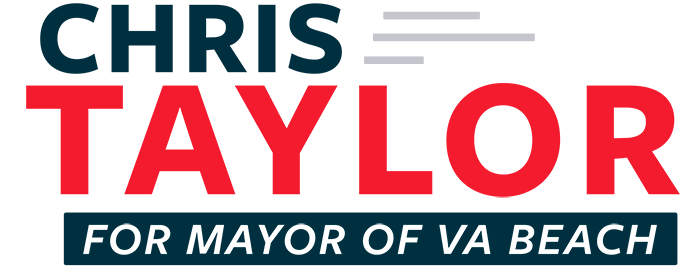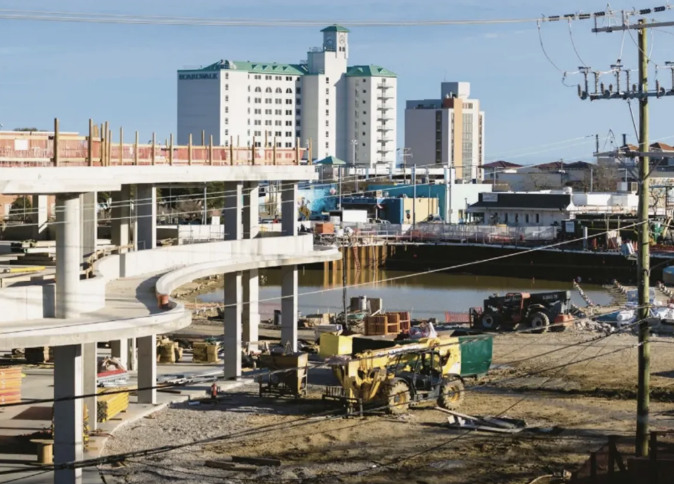Councilman Chris Taylor first brought up the water issue at Tuesday’s council meeting before the body met in private to discuss it. It could be hashed out in a public meeting soon.
This is not the first time “unforseen site conditions” have driven up the city’s cost on the public-private Atlantic Park project.
VIRGINIA BEACH — Construction of the surf lagoon at Atlantic Park has stalled for a month as the project’s developer and the city disagree over who is on the hook to cover the cost of an unexpected environmental issue.
Contaminated water is building up in a 10-foot hole about the size of a baseball field that will become the surf lagoon. On Wednesday, the excavated area was filled halfway with rust-colored groundwater. Higher than expected levels of iron and arsenic are present in the water, according to the developer, Venture Realty Group, who says it’s the city’s responsibility to pay the rougly $1 million it will cost to remove the contaminants and discharge the water.
The extent of the problem became apparent in the fall when a neighbor filed a complaint about observing brown water and a rusty film on a cove off Lake Holly, a few blocks south of the Atlantic
Park site.
The Virginia Department of Environmental Quality inspected the cove and traced the elevated level of contaminants back to the surf lagoon excavation.
The Atlantic Park project is permitted to discharge water in Lake Holly, but following the neighbor’s complaint, the DEQ began reviewing the project’s dewatering methods and has been working with the developers on additional water treatment options, according to documents provided by the DEQ. No wildlife deaths were observed, according to the DEQ.
The dewatering process stopped Dec. 22, slowing construction of the surf park, according to Venture.
The Virginia Beach Development Authority owns the Atlantic Park land and is leasing it Venture Realty Group. The Virginia Beachbased company has partnered with celebrity Pharrell Williams
on the $325 million project. Phase 1 is under construction and includes the surf park, entertainment venue, two parking garages and a building that will house shops, apartments and offices. It’s expected to open in spring 2025.
The city ’s Development Authority was responsible for environmental review and remediation of the land where the old Dome building used to be, which is where the lagoon is being built, during the “due diligence” phase, according to the development agreement.
In a Jan. 12 letter sent by a law firm representing Virginia Beach to the developer, city attorneys said “any items or liabilities were to be determined in the due diligence phase.” The project has advanced to the construction phase.
“No such conditions were identified and therefore no such liabilities exist,” the city attorneys wrote. They concluded the Development Authority is not responsible for unforeseen site conditions of the surf lagoon or any liabilities Venture has with its general contractor, W.M. Jordan, outside of the contract’s guaranteed maximum price.
The developer’s attorney responded Jan. 16, arguing that the Development Authority’s obligation to pay for environmental mediation hasn’t expired.
“As owner of the site, the City has absorbed the remediation costs associated with removing major debris, old fuel tanks, petroleum contaminated soil, the remnants of the old Dome, and now, contaminated water,” Mike Culpepper, principal of Venture Realty Group, wrote in an email to The Virginian-Pilot this week. “These expenses are the responsibility of the City, and they were not apparent until the site was under construction.”
Venture has asked the city to scale back its infrastructure improvements around the project to pay for the cost overrun.
“This work was NOT a requirement of the Atlantic Park project or the Developer,” Culpepper wrote. “This was necessary road and utility work, similar to the work already completed in 19th, 18th and pending in 17th Streets. The City elected to accelerate this work during the Atlantic Park construction versus completing a $325 million project — and tearing up roads and utilities again 4-5 years later.”
Councilman Chris Taylor first brought up the water issue at Tuesday’s council meeting before the body met in private to discuss it. It could be hashed out in a public meeting soon.
This is not the first time “unforeseen site conditions” have driven up the city’s costs on the public-private Atlantic Park project. As part of the original agreement, the city agreed to pay $90 million for specific portions of the project. But changes to the project and some rising construction costs now put the city’s contributions at more than $150 million.
The city has undertaken major infrastructure improvements surrounding Atlantic Park, including the decommissioning and removal a Dominion Energy substation on 18th Street, storm water improvements and other franchise utility relocations such as Cox and Verizon.
Most recently, in December, the City Council agreed to shuffle $1.75 million from the project’s parking fund to cover added costs associated with burying power lines along the project’s perimeter. Infrastructure improvements costs have grown by roughly $37 million. In total, the city has so far agreed to spend $60 million more than originally planned for offsite utility work and entertainment venue upgrades.


